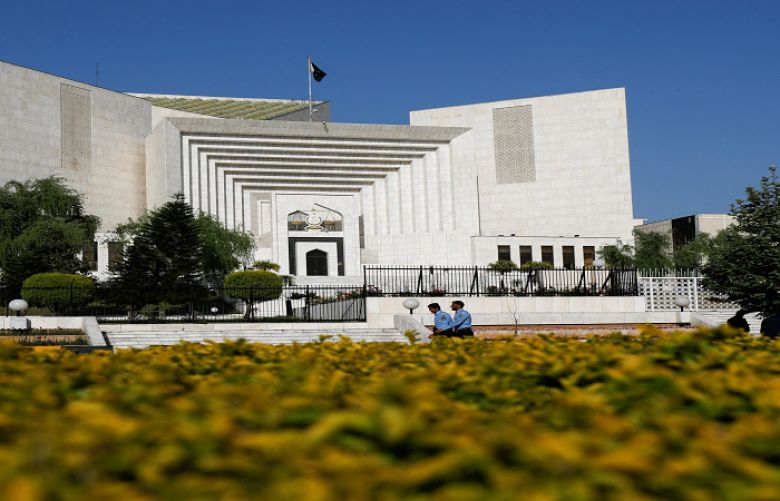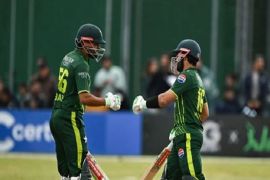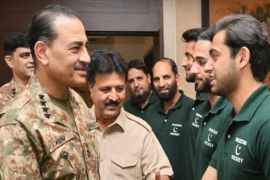A seven-member bench of the Supreme Court (SC) on Thursday refused to issue a stay order on the decision to conduct trials of civilians in military courts.
The chief justice remarked that the apex court will first hear arguments from Attorney General for Pakistan Mansoor Usman Awan on the say order plea. It also sought arguments from another petitioner, Faisal Siddiqui, tomorrow.
A nine-member larger bench, headed by Chief Justice of Pakistan Umar Ata Bandial and hearing a set of petitions against the military court trials of civilians, has been dissolved after Justice Qazi Faez Isa and Justice Sardar Tariq recused themselves.
Resuming the hearing, Justice Mansoor Ali Shah said if anyone has any objection to the bench, they should state it now.
The attorney general for Pakistan and Sardar Latif Khosa both said they did not have any objection.
CJP Bandial told the counsel for petitioner PTI Chairman Imran Khan that their petition had political questions. He added that they did not want to hear that right now, as their focus was military courts.
Latif Khosa said after the implementation of Article 245, the power of high courts under Article 199 has ceased.
He further said the formation commanders conference stated that there is irrefutable evidence of May 9 violence.
The CJP asked if the press release said there is irrefutable evidence, the trial will be conducted in a military court?
Khosa replied in the affirmative and read out the press release. The entire military leadership decided that there was irrefutable evidence.
He remarked that if the formation commanders said there was irrefutable evidence, would a colonel give a different verdict in the trial?
Khosa said he wasn’t saying that the May 9 culprits must be let off the hook.
On being asked by Justice Shah, the counsel read out the anti-terrorism court verdicts regarding handing over of suspects to the military.
On being asked, Khosa said 50 people were arrested on May 10 and five cases registered against them that night over attacks on the Corps Commander House. All the cases were registered under terrorism provisions, though no FIR mentions Army Act.
The FIRs have nominated PTI Chairman Imran Khan among other leaders. Across the country, 4,000 people were arrested.
When Justice Ayesha Malik asked if the military court verdicts can be challenged, Latif Khosa questioned who will dare to challenge them?
When Justice Afridi asked how many people have been sent for trial under military courts, Khosa said 10 from somewhere and 20 at other places.
Justice Muneeb Akhtar asked if a trial under the Official Secrets Act can be held in the anti-terrorism court. Latif Khosa responded in the affirmative.
Justice Malik remarked that only their own people can be handed over to military courts, adding civilians cannot be handed over to military courts.
Justice Akhtar observed that civilians have a right to approach the high court for basic rights in military courts, adding the issue of basic rights can be brought to the Supreme Court too.
Justice Afridi remarked that the ATC handed over the suspects to military authorities under Section 549(3). However, Justice Akhtar interjected that on the Law Ministry’s website, there is no sub-section 3 of Section 549.
CJP Bandial told the counsel that he was saying there was no right to appeal against military courts, and the decision of military courts is not public.
The Army Act is meant for those belonging to the armed forces, Justice Ayesha Malik said.
The Supreme Court has also sought the details of all the arrests made after May 9. The AGP was asked to furnish details of the arrests of women, children and journalists.
“If journalists are imprisoned, they should be released,” CJP Bandial ordered.
He then addressed the AGP and said official meetings are currently being spied on, and telephone conversations monitored. Videos are being recorded, and recordings being made, the CJP remarked.
The right to privacy given by the Constitution is not protected either, he observed.
The hearing was adjourned till tomorrow.
Justice Isa raises objections; bench dissolved
The Supreme Court had earlier started hearing four petitions against the military court trials of individuals involved in targeting military installations during violent protests across the country following the arrest of Pakistan Tehreek-e-Insaf (PTI) Chairman Imran Khan in November.
Headed by CJP Bandial, the nine-member larger bench comprised Justice Qazi Faez Isa, Justice Sardar Tariq Masood, Justice Ijazul Ahsan, Justice Mansoor Ali Shah, Justice Muneeb Akhtar, Justice Yahya Afridi, Justice Mazahar Ali Akbar Naqvi, and Justice Ayesha Malik.
At the outset of the proceedings, Justice Isa remarked that he will give a verdict according to the law and Constitution, adding that one of the laws is the Practice and Procedure Act.
He further said that according to this law, a bench has to be formed in a meeting, adding he was astonished when he saw the cause list for today’s case on Wednesday evening.
The senior judge remarked that the law was suspended at the stage of the bill, adding he will speak in military terms.
“Let me read a sentence of the court order in the Practice and Procedure case,” Justice Isa said
He added that on March 15, he was heading a bench on a suo motu notice. “I was surprised that a circular was issued for ignoring the order. This is the explanation of the Supreme Court,” Justice Isa commented.
“Later, my decision was withdrawn from the court order,” he further remarked, asking his fellow judges what kind of bench that was.
“I wrote a note on April 8, which was also removed from the website,” Justice Isa went on to say. “The chief justice asked me on May 16 if I will do chamber work. I’ll tell you today why I went on to do chamber work today.”
Justice Isa then recused himself from the bench, saying until a decision on the Practice and Procedure Act, he did not consider this bench a bench.
Justice Isa and Justice Sardar Tariq raised objections to the bench. To this, the CJP said they could figure something out.
“I am not refusing to accept a decision, I am talking about a procedure,” Justice Isa responded.
There are four applications before the court right now, the judge said, adding the first application was by “Imran Niazi”.
Justice Tariq asked counsel Latif Khosa why he moved the apex court on Article 184(3), asking why they did not go to the high court under Article 199.
The CJP observed that a decision on the Practice and Procedure Act has not been announced yet because the attorney general sought time.
“Whatever we did was according to our oath,” CJP Bandial said.
The case will now be heard by a seven-member bench at 1:30pm.
Four petitions against military trials
As many as four petitions have been fixed for hearing against the trial of civilians in military courts, while the SC Registrar’s Office has not objected to any of them.
CJP Bandial has given his approval to the fixing of these pleas.
Prominent figures such as Hamid Khan, Aitzaz Ahsan, PTI Chairman Imran Khan, and former CJP Justice (retd) Jawwad S Khawaja, among others, have filed petitions in the apex court challenging the trial of civilians in military courts.
Following the violent incidents of May 9, the government decided to transfer the cases of individuals involved in damaging military installations to military courts.







